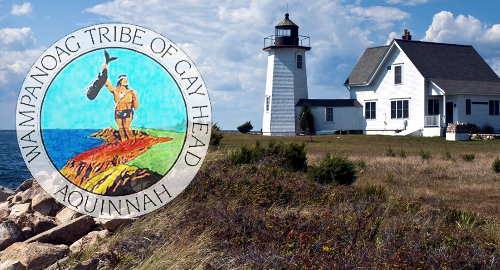- Wampanoag Casino Martha Vineyard Winery
- Wampanoag Casino Martha Vineyard Lodge
- Wampanoag Casino Martha's Vineyard
The new European data protection law requires us to inform you of the following before you use our website:

- The site of the Aquinnah Wampanoag's proposed casino has been secured while the two sides await an appeals court decision.
- Historic journey by native people from Plymouth, MA to Martha's Vineyard in a mishoon.
If the Wampanoag tribe opens a facility on Martha's Vineyard, however, residents of Cape Cod will find themselves much closer to gambling opportunity. Nantucket is an island of about 10,000 people located south of Cape Cod.
We use cookies and other technologies to customize your experience, perform analytics and deliver personalized advertising on our sites, apps and newsletters and across the Internet based on your interests. By clicking 'I agree' below, you consent to the use by us and our third-party partners of cookies and data gathered from your use of our platforms. See our Privacy Policy and Third Party Partners to learn more about the use of data and your rights. You also agree to our Terms of Service.
| Total population |
|---|
| 1,121[1] |
| Regions with significant populations |
| United States (Massachusetts) |
| Languages |
| English, Wampanoag |
| Religion |
| traditional tribal religion |
| Related ethnic groups |
| other Wampanoag people |
The Wampanoag Tribe of Gay Head (Aquinnah) is a federally recognized tribe of Wampanoag people based in the town of Aquinnah on the southwest tip of Martha's Vineyard in Massachusetts.[2] The tribe hosts an annual Cranberry Day celebration.[3]
The tribe received official recognition in 1987, the same year that their land claim on Martha's Vineyard was settled by an act of Congress, with agreement by the state and the United States Department of Interior. The government took into trust on behalf of the tribe 485 acres of Tribal Lands purchased (160 acres private and approximately 325 acres common lands). In 2011 the state of Massachusetts passed a law allowing legalized gambling, and federally recognized Native American tribes began to develop proposals to develop casinos.
Faced with state opposition to a Class III facility on its land, in 2013 the Wampanoag Tribe of Gay Head proposed a Class II facility to be developed on its property. The state and town filed suit against it in federal district court, and the judge ruled in their favor. The tribe, together with the Department of Interior, appealed to the US Court of Appeals, First Circuit, defending its case in December 2016.
Government[edit]
The Wampanoag Tribe of Gay Head is governed by an elected eleven-member council. The current administration is as follows.[4]
- Chairman: Cheryl Andrews-Maltais
- Vice-Chairman: Richard Randolph
- Treasurer: Stephanie White
- Secretary: Eleanor Hebert
- Council: Naomi Carney
- Council: Alvin Clark Jr.
- Council: Steven Craddock
- Council: Kristina Hook
- Council: Keith Marden
- Council: Daniel Vainshtein
- Council: Leigh Vanderhoop
- Honorary Tribal Chief: F. Ryan Malonson
- Honorary Tribal Medicine Man: Jason Baird
The tribe's honorary tribal chief and the medicine man are hereditary positions held for life.

Economic development[edit]
Muckleshoot casino jobs. The Aquinnah Wampanoag tribe operates a shellfish hatchery on Menemsha Pond, cultivating oysters. Tourism is also very important to the tribe.[2] Many tribal members own their own businesses,[3] while others have had to move off island for employment.
History[edit]
Wampanoag people have lived in the area of Aquinnah, Massachusetts, for millennia. Traditionally, they fished, grew crops, and hunted whales. English people began settling in the region in large numbers by the 17th and 18th centuries, encroaching on Wampanoag lands. Over time the Wampanoag were dispossessed of their lands.[5] Some intermarried with English colonists and later European-American generations. As the Wampanoag had a matrilinealkinship system, they considered all children born to their women to be Wampanoag. They carried on their culture this way. Descent and inheritance passed through the women's lines.
In the nineteenth century, most Wampanoag men worked in the whaling industry on board ships. Some advanced in rank; for instance, Amos Hoskins became master of the Massasoit in 1851. (See photo above)[6]
20th century[edit]
In 1972, the Wampanoag people on the island formed the Wampanoag Tribal Council of Gay Head, Inc. for cultural preservation and political self-determination. It filed a land claim suit in 1974, seeking to gain title to 3,000 acres of lands lost to the state and town. In the nineteenth century, these bodies had not gained federal approval through the Senate for extinguishment of Wampanoag title, as required under the 1790 Non-Intercourse Act.[7] The Wampanoag claimed part of the public lands in the Town of Gay Head (now Aquinnah). The suit was controversial, clouding title to other lands in the town.
The US federal government formally recognized the Wampanoag Tribe of Gay Head (Aquinnah) on April 10, 1987.[5] Under the Massachusetts Indian Land Claim Settlement Act of 1987, the federal government agreed to take into trust on behalf of the tribe approximately 485 acres of Tribal Lands purchased (160 acres private and approximately 325 acres common lands). The Town of Aquinnah contributed some land and the state of Massachusetts contributed up to $2,250,000 to a fund so that the Wampanoag could acquire land to be held for communal purposes. Common lands include the Gay Head Cliffs, Herring Creek, and Lobsterville. The private lands are in several parcels. Other land owned by the Tribe includes parcels in Christiantown and Chappaquiddick, both on the island.[5][8] The settlement provides details as to responsibilities and jurisdiction.
Since that time, in 1988 the Congress passed the Indian Gaming Regulatory Act, to establish a regulatory framework for gaming on Native American lands within the jurisdiction of federally recognized tribes. As required by law, the Tribe soon submitted its proposed gaming ordinance to the National Indian Gaming Commission (NIGC).
21st century[edit]
The tribe withdrew its earlier proposed gaming ordinance, submitting an amended form in May 2013. By letter dated 23 August 2013, the Solicitor of the Department of Interior responded to an inquiry by the National Indian Gaming Commission (NIGC) and said that the Wampanoag were not prohibited by the terms of their 1987 Settlement Act from applying for approval of gaming on their lands, in accordance with state laws.[7]
The tribe has pulled back from an earlier proposal to develop a Class III gaming casino on its land, to which the state had objected. The state said the tribe was limited to local zoning on its land based on the 1987 settlement agreement.
The state had been working to license privately developed casinos in three regions of the state. This plan included negotiating with the Mashpee Wampanoag Tribe for a casino to be developed in Taunton, Massachusetts, which the tribe had acquired. This project was challenged in federal district court by opponents in February 2016 based on language defining Indian tribes recognized by the government in the Indian Reorganization Act of 1934. It has been appealed to the US Court of Appeals, First Circuit, for exploration of the definitions.

The governor and other parties opposed approving a Class III casino to be developed by the Wampanoag tribe on the Vineyard. As of 2014, the Gay Head Wampanoag proposed to adapt an existing building for a Class II boutique casino. It was challenged in federal district court in a suit by the state, joined by the Town of Aquinnah.[9]
In June 2016 the US District Court ruled against the tribe. Judge J. Dennis Saylor IV said that the tribe was subject to state and local regulation of gambling. In addition, he determined that the Wampanoag Tribe of Gay Head (Aquinnah) did not have 'sufficient governmental control' over its reservation to manage a casino. 'Mr. Rappaport explained that this referred to the tribe's lack of police (they have only conservation rangers), ambulance service, firefighting staff, or any jurisdiction over the behavior of nontribe members on tribal property. Should anything go wrong at the casino, the Town of Aquinnah was neither willing nor able to assume those responsibilities.'[10]

- The site of the Aquinnah Wampanoag's proposed casino has been secured while the two sides await an appeals court decision.
- Historic journey by native people from Plymouth, MA to Martha's Vineyard in a mishoon.
If the Wampanoag tribe opens a facility on Martha's Vineyard, however, residents of Cape Cod will find themselves much closer to gambling opportunity. Nantucket is an island of about 10,000 people located south of Cape Cod.
We use cookies and other technologies to customize your experience, perform analytics and deliver personalized advertising on our sites, apps and newsletters and across the Internet based on your interests. By clicking 'I agree' below, you consent to the use by us and our third-party partners of cookies and data gathered from your use of our platforms. See our Privacy Policy and Third Party Partners to learn more about the use of data and your rights. You also agree to our Terms of Service.
| Total population |
|---|
| 1,121[1] |
| Regions with significant populations |
| United States (Massachusetts) |
| Languages |
| English, Wampanoag |
| Religion |
| traditional tribal religion |
| Related ethnic groups |
| other Wampanoag people |
The Wampanoag Tribe of Gay Head (Aquinnah) is a federally recognized tribe of Wampanoag people based in the town of Aquinnah on the southwest tip of Martha's Vineyard in Massachusetts.[2] The tribe hosts an annual Cranberry Day celebration.[3]
The tribe received official recognition in 1987, the same year that their land claim on Martha's Vineyard was settled by an act of Congress, with agreement by the state and the United States Department of Interior. The government took into trust on behalf of the tribe 485 acres of Tribal Lands purchased (160 acres private and approximately 325 acres common lands). In 2011 the state of Massachusetts passed a law allowing legalized gambling, and federally recognized Native American tribes began to develop proposals to develop casinos.
Faced with state opposition to a Class III facility on its land, in 2013 the Wampanoag Tribe of Gay Head proposed a Class II facility to be developed on its property. The state and town filed suit against it in federal district court, and the judge ruled in their favor. The tribe, together with the Department of Interior, appealed to the US Court of Appeals, First Circuit, defending its case in December 2016.
Government[edit]
The Wampanoag Tribe of Gay Head is governed by an elected eleven-member council. The current administration is as follows.[4]
- Chairman: Cheryl Andrews-Maltais
- Vice-Chairman: Richard Randolph
- Treasurer: Stephanie White
- Secretary: Eleanor Hebert
- Council: Naomi Carney
- Council: Alvin Clark Jr.
- Council: Steven Craddock
- Council: Kristina Hook
- Council: Keith Marden
- Council: Daniel Vainshtein
- Council: Leigh Vanderhoop
- Honorary Tribal Chief: F. Ryan Malonson
- Honorary Tribal Medicine Man: Jason Baird
The tribe's honorary tribal chief and the medicine man are hereditary positions held for life.
Economic development[edit]
Muckleshoot casino jobs. The Aquinnah Wampanoag tribe operates a shellfish hatchery on Menemsha Pond, cultivating oysters. Tourism is also very important to the tribe.[2] Many tribal members own their own businesses,[3] while others have had to move off island for employment.
History[edit]
Wampanoag people have lived in the area of Aquinnah, Massachusetts, for millennia. Traditionally, they fished, grew crops, and hunted whales. English people began settling in the region in large numbers by the 17th and 18th centuries, encroaching on Wampanoag lands. Over time the Wampanoag were dispossessed of their lands.[5] Some intermarried with English colonists and later European-American generations. As the Wampanoag had a matrilinealkinship system, they considered all children born to their women to be Wampanoag. They carried on their culture this way. Descent and inheritance passed through the women's lines.
In the nineteenth century, most Wampanoag men worked in the whaling industry on board ships. Some advanced in rank; for instance, Amos Hoskins became master of the Massasoit in 1851. (See photo above)[6]
20th century[edit]
In 1972, the Wampanoag people on the island formed the Wampanoag Tribal Council of Gay Head, Inc. for cultural preservation and political self-determination. It filed a land claim suit in 1974, seeking to gain title to 3,000 acres of lands lost to the state and town. In the nineteenth century, these bodies had not gained federal approval through the Senate for extinguishment of Wampanoag title, as required under the 1790 Non-Intercourse Act.[7] The Wampanoag claimed part of the public lands in the Town of Gay Head (now Aquinnah). The suit was controversial, clouding title to other lands in the town.
The US federal government formally recognized the Wampanoag Tribe of Gay Head (Aquinnah) on April 10, 1987.[5] Under the Massachusetts Indian Land Claim Settlement Act of 1987, the federal government agreed to take into trust on behalf of the tribe approximately 485 acres of Tribal Lands purchased (160 acres private and approximately 325 acres common lands). The Town of Aquinnah contributed some land and the state of Massachusetts contributed up to $2,250,000 to a fund so that the Wampanoag could acquire land to be held for communal purposes. Common lands include the Gay Head Cliffs, Herring Creek, and Lobsterville. The private lands are in several parcels. Other land owned by the Tribe includes parcels in Christiantown and Chappaquiddick, both on the island.[5][8] The settlement provides details as to responsibilities and jurisdiction.
Since that time, in 1988 the Congress passed the Indian Gaming Regulatory Act, to establish a regulatory framework for gaming on Native American lands within the jurisdiction of federally recognized tribes. As required by law, the Tribe soon submitted its proposed gaming ordinance to the National Indian Gaming Commission (NIGC).
21st century[edit]
The tribe withdrew its earlier proposed gaming ordinance, submitting an amended form in May 2013. By letter dated 23 August 2013, the Solicitor of the Department of Interior responded to an inquiry by the National Indian Gaming Commission (NIGC) and said that the Wampanoag were not prohibited by the terms of their 1987 Settlement Act from applying for approval of gaming on their lands, in accordance with state laws.[7]
The tribe has pulled back from an earlier proposal to develop a Class III gaming casino on its land, to which the state had objected. The state said the tribe was limited to local zoning on its land based on the 1987 settlement agreement.
The state had been working to license privately developed casinos in three regions of the state. This plan included negotiating with the Mashpee Wampanoag Tribe for a casino to be developed in Taunton, Massachusetts, which the tribe had acquired. This project was challenged in federal district court by opponents in February 2016 based on language defining Indian tribes recognized by the government in the Indian Reorganization Act of 1934. It has been appealed to the US Court of Appeals, First Circuit, for exploration of the definitions.
The governor and other parties opposed approving a Class III casino to be developed by the Wampanoag tribe on the Vineyard. As of 2014, the Gay Head Wampanoag proposed to adapt an existing building for a Class II boutique casino. It was challenged in federal district court in a suit by the state, joined by the Town of Aquinnah.[9]
In June 2016 the US District Court ruled against the tribe. Judge J. Dennis Saylor IV said that the tribe was subject to state and local regulation of gambling. In addition, he determined that the Wampanoag Tribe of Gay Head (Aquinnah) did not have 'sufficient governmental control' over its reservation to manage a casino. 'Mr. Rappaport explained that this referred to the tribe's lack of police (they have only conservation rangers), ambulance service, firefighting staff, or any jurisdiction over the behavior of nontribe members on tribal property. Should anything go wrong at the casino, the Town of Aquinnah was neither willing nor able to assume those responsibilities.'[10]
The federal government has sided with the tribe, keeping the issue alive. Saying there were 'material errors' in the judge's decision, the tribe appealed the ruling to the US Appeals Court, First Circuit in December 2016, with support of the US Department of Interior.[10]
In February 2019, the tribe announced it will begin construction of the Aquinnah Cliffs Casino in March 2019. The Wampanoag Tribe of Gay Head is scheduled proceed with construction despite opposition from the towns of Aquinnah and Chilmark, and a request from the Martha's Vineyard Commission for the Wampanoag tribe to work with the commission to 'preserve the unique values of the Vineyard.' The Wampanoag tribe says the commission has no jurisdiction over the project.[11]
Notes[edit]
- ^'Tribal Council.'Wampanoag Tribe of Gay Head. Retrieved 25 May 2013.
- ^ ab'Wampanoag Tribe of Gay Head - Aquinnah.'Region 1: EPA New England. Retrieved 25 May 2013.
- ^ abPritzker 475
- ^'Tribal Council'. Wampanoag Tribe of Gay Head (Aquinnah). Retrieved 6 December 2019.
- ^ abc'History and Culture.'Wampanoag Tribe of Gay Head. Retrieved 25 May 2013.
- ^New Bedford Whaling Museum
- ^ ab'Aquinnah Settlement Act Interpretation', Ofc of the Solicitor, 23 August 2013, Dept. of Interior
- ^'Massachusetts Indian Land Claim Settlement Act of 1987, 25 U.S.C. § 1771, et seq.'
- ^'Aquinnah, community group seek to join state suit against tribe casino', MV Times, 16 July 2014, at Aquinnah/Gay Head Community Association website, accessed 29 December 2014
- ^ abBill Chaisson, 'Wampanoag Tribe pushes casino case to the U.S. Court of Appeals', MV Times (Martha's Vineyard), 21 December 2016; accessed 19 January 2017
- ^Brennan, George (24 February 2019). 'Tribe moves ahead with casino construction'. The Martha's Vineyard Times. Retrieved 26 February 2019.
Wampanoag Casino Martha Vineyard Winery
References[edit]
- Pritzker, Barry M. A Native American Encyclopedia: History, Culture, and Peoples. Oxford: Oxford University Press, 2000. ISBN978-0-19-513877-1
Wampanoag Casino Martha Vineyard Lodge
External links[edit]
- Wampanoag Tribe of Gay Head (Aquinnah) , official website